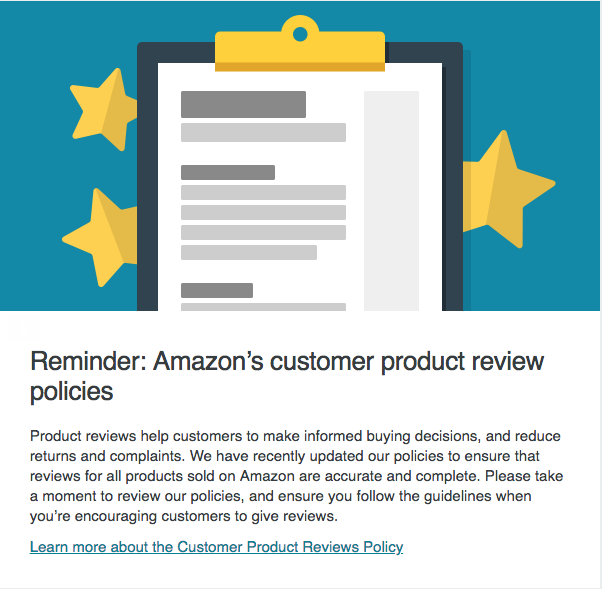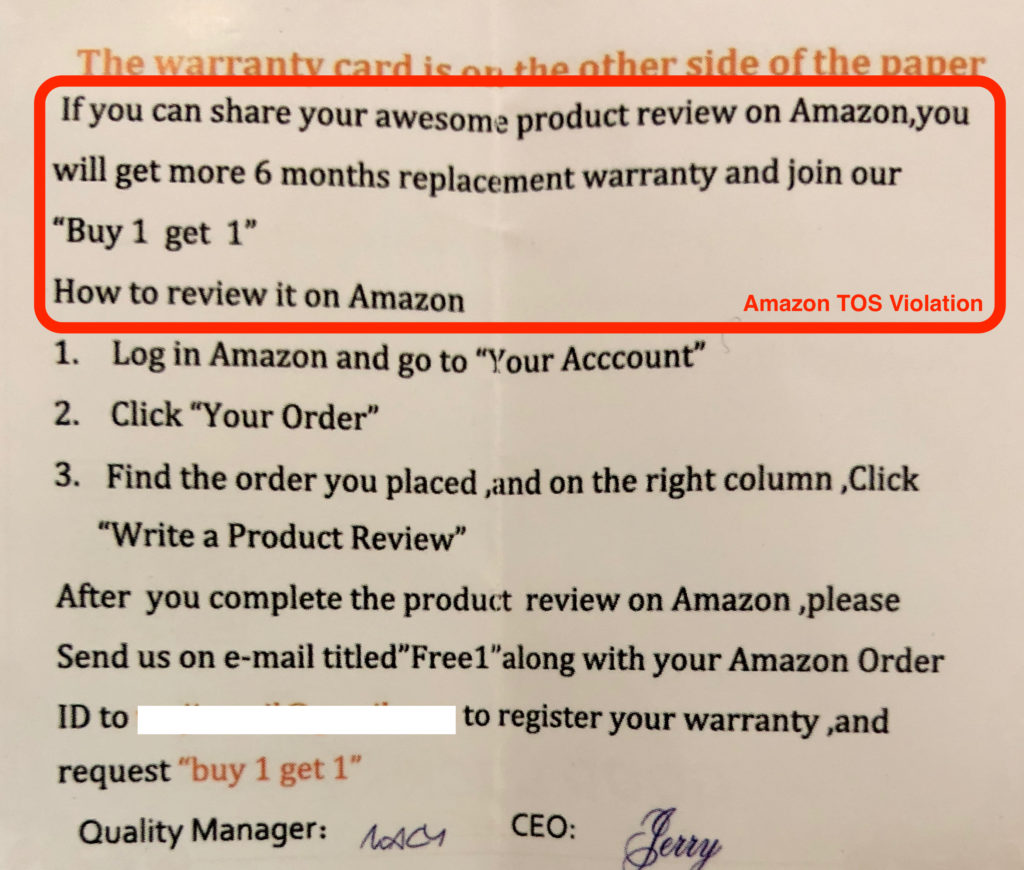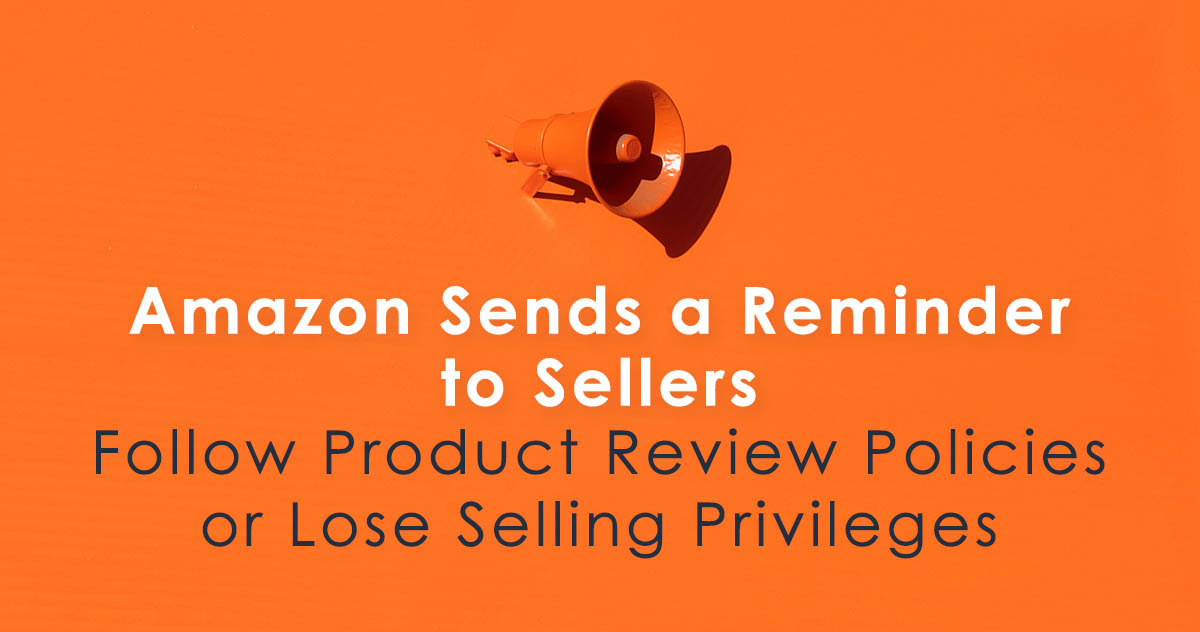Now is the time to get your review acquisition tactics inline with Amazon’s Terms of Service to avoid account suspension.
At the top of Amazon’s October 2018 Seller Newsletter, there is a reminder for sellers to review Amazon’s customer product review policies. Upon clicking through the link provided in the email, you are prompted to log in to Seller Central where you can read Amazon prompting as well as click through to more in-depth resources.

I don’t think this article is shedding light on any upcoming, drastic changes to customer/product reviews (since they are crucial to a customer’s purchasing decision) but I do believe the article is a friendly reminder for everyone—especially with the holiday shopping season fast approaching.
You can read the entire article here (must be logged in to Seller Central). But if you want to save yourself some time, here a few highlights that I think are most pertinent.
Amazon’s Zero-Tolerance Policy Toward Review Violations
Amazon believes that reviews are still beneficial to both customers and sellers. But if a seller violates the company’s review policies—and gets caught—then they will likely face one or all of these penalties, which are:
- Immediate and permanent withdrawal of the seller’s selling privileges on Amazon and withholding of funds.
- The removal of all the product’s reviews and preventing the product from receiving future reviews or ratings.
- Permanent delisting of the product from Amazon.
- Legal action against the seller, including lawsuits and referral to civil and criminal enforcement authorities.
- Disclosing the seller’s name and other related information publicly.
And if you don’t think Amazon is serious about this topic, just refer to the massive policy update it made two years to the day in 2016 when it banned incentivized reviews entirely.
What Constitutes an Amazon Customer Review Policy Violation?
In this recent article, Amazon goes more into depth as to who should be responsible for adhering to its review policies. A seller can no longer play the fool if they get busted by blaming an employee, partner or 3rd party partner. Everyone is responsible.
Here are the explicit policy violations that Amazon has outlined:
- A seller cannot post a review of their own product or their competitor’s product.
- A seller cannot offer a third party a financial reward, discount, free products, or other compensation in exchange for a review on their product or their competitor’s product. This includes using services that sell customer reviews, websites, or social media groups.
- A seller cannot offer to provide a refund or reimbursement after the buyer writes a review (including reimbursement via a non-Amazon payment method). This could be done via buyer-seller messaging on Amazon or directly contacting customers or using 3rd party services, websites, or social media groups.
- A seller cannot use a third-party service that offers free or discounted products tied to a review (for example, a review club that requires customers to register their Amazon public profile so that sellers can monitor their reviews).
- A family member or employee of the seller cannot post a review of the seller’s product or a competitor’s product.
- A seller cannot ask a reviewer to change or remove their review. They might also offer a refund or other compensation to a reviewer in exchange for doing so.
- A seller cannot divert negative reviews to be sent to them or to a different feedback mechanism while positive reviews are sent to Amazon.
- A seller cannot create a variation relationship between products with the aim of manipulating reviews and boosting a product’s star rating via review aggregation.
- A seller cannot insert a request for a positive Amazon review or an incentive in exchange for a review into product packaging or shipping box.
Example:

- A seller cannot use a customer’s account to write or change a review on his or his competitor’s product.
Final Takeaway
The points that Amazon listed shouldn’t be a surprise or anything new to sellers. But the company has to let its sellers know from time to time what is permissible to draw a line in the sand.
Amazon wants people to review your products. This article gives sellers a chance to correct any potential violations before Amazon has to crack down and be the “bad guy.” In fact, thousands of Amazon sellers use Feedback Genius to get 100% TOS compliant product reviews. Even though some sellers have become confused as to whether or not they can even ask for a product review.
Contrary to some misaligned opinion, you can, and should, ask for a product review from everyone who buys from you. By asking your buyers to share their honest opinions about your products you’ll receive reviews that benefit everyone—whether they be positive, neutral or negative.
If you feel like you’re in violation of the 10 points listed by Amazon as incorrect review acquisition tactics, then now is the time to correct them. This is especially true as everyone’s sales volume will swell during the holidays.

Get product reviews the right way (more to come!) by asking your buyers to share their opinion on Amazon with automated Buyer-Seller messaging!
Save time, build your brand and improve your reputation with Feedback Genius. Try it now for free for 30 days!







